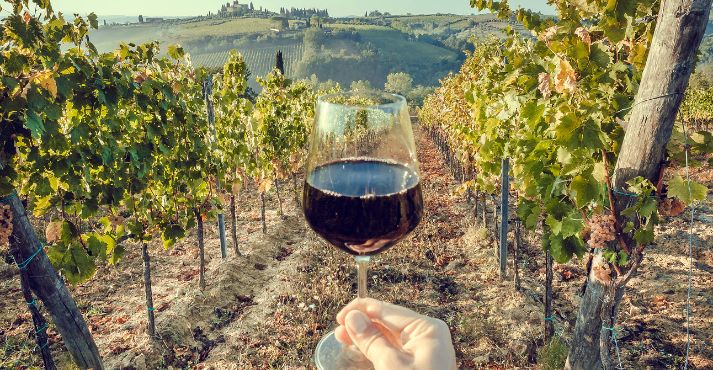Recently, there has been a surge of interest in “Natural Wines.” Wine enthusiasts and those curious about sustainable winemaking are exploring this intriguing domain.
This article aims to shed light on the world of Natural Wines. We will define what exactly they are, delve into the methods used in their production, and uncover why they hold a unique appeal for wine enthusiasts.
Let’s begin exploring natural wines.
Defining Natural Wines

Natural wines are a celebration of simplicity and purity in winemaking. They stand apart from conventional wines by adhering to the fundamental principle of minimal intervention.
Unlike their counterparts, natural wines embrace a more hands-off approach during their production.
These wines are closely tied to traditional winemaking practices and often revolve around organic farming and biodynamic viticulture. What sets them apart? The answer lies in the simplicity of their production process, which we’ll explore in detail in the following sections.
So, let’s unravel the essence of natural wines and understand what makes them unique in winemaking.
The Production Process of Natural Wines
Crafting natural wines is akin to an intricate art form, relying on distinct methods that set them apart from the mainstream. The careful selection of organic or biodynamic grapes is at the heart of this process.
These grapes are cultivated with a deep-rooted commitment to sustainable and eco-friendly practices, harmonizing with the environment rather than challenging it.
A pivotal aspect of natural wine production is native yeast fermentation. Unlike conventional wines, which often introduce cultivated yeasts, natural wines allow wild and indigenous yeasts to take the lead on grape skins and in the winery environment.
This wild fermentation adds an element of unpredictability and complexity to the wines, making each bottle a unique expression of its terroir.
One of the defining features of natural wines is their dedication to minimal additives. This means winemakers refrain from adding chemicals or preservatives during the winemaking process.
By doing so, they let the grapes and their environment speak for themselves, resulting in wines that faithfully reflect the nuances of the vineyard.
The Appeal of Natural Wines

Embracing natural wines has become a captivating choice for wine enthusiasts, and the reasons behind their popularity are both intriguing and compelling. One of the key draws is natural wines’ distinct flavor profile.
Unlike their conventional counterparts, natural wines often showcase a vibrant tapestry of flavors that intimately connect with the grapes’ place of origin, creating an unparalleled tasting experience.
Another compelling factor is their profound connection to terroir, the unique characteristics of the vineyard’s environment.
Natural winemakers prioritize allowing the terroir’s expression to shine through in each bottle, making every sip a journey through the landscape where the grapes were nurtured.
Beyond the palate, the allure of natural wines extends to ethical and sustainable winemaking practices.
Enthusiasts are drawn to the commitment to Sustainable Viticulture and Ethical Winemaking, knowing that each bottle represents a step towards a more environmentally conscious and responsible future in the world of wine.
Common Misconceptions
Certain myths and misconceptions often swirl around in natural wines, perplexing many curious minds.
One of the common misconceptions is related to their consistency. Some believe natural wines are inherently inconsistent in flavor, but this perception needs to capture the whole picture.
While natural wines may exhibit variations due to minimal intervention production, this doesn’t mean they lack quality or predictability. These subtle differences are often celebrated, reflecting each vintage’s uniqueness and nature’s dynamic interplay.
Another misconception revolves around the shelf life of natural wines. It’s often thought that they don’t age well, but the reality is more nuanced.
The aging potential of natural wines can be impressive when stored under suitable conditions. Properly made natural wines can evolve beautifully, like their conventional counterparts.
These misconceptions arise from a need for more understanding and exposure. To debunk these natural wine myths, exploring the facts and embracing the charming quirks that make natural wines a fascinating category within viticulture is essential.
Natural Wine Trends
Riding the natural wine wave has become a captivating journey in the wine world, and current trends reflect an evolving landscape driven by changing consumer preferences.
One prominent trend is the proliferation of natural wine bars, where enthusiasts gather to explore the diverse and dynamic world of natural wines. These establishments offer a vibrant atmosphere for discovering unique and unadulterated flavors.
This shift towards more natural and organic options is also reflected in other segments of the hospitality industry. Bars, much like wine establishments, are embracing evolving bar industry trends, such as offering unique and locally sourced beverages that align with the preferences of the modern consumer.
Another exciting trend is the emergence of new natural wine-producing regions. While traditional wine regions have long dominated the scene, adventurous winemakers are now pushing boundaries in previously untapped areas.
This expansion reshapes the wine map, with regional natural winemakers crafting exceptional bottles celebrating their unique terroirs.
These trends underscore a shift in consumer preferences toward wines that embody the ethos of the Natural Wine Movement.
As more people seek authenticity, sustainability, and a connection to the land in their wine choices, the natural wine industry continues to flourish and diversify.
Conclusion
In conclusion, the journey through the world of natural wines has been captivating, shedding light on an increasingly popular and unique corner of the wine universe.
Natural wines, with their distinctive flavor profiles and commitment to sustainable viticulture, have carved out a special place in the hearts of wine enthusiasts.
These wines, born from minimal intervention and a deep connection to terroir, offer an unparalleled tasting experience that reflects the true essence of the vineyard.
As we’ve explored, they’ve found a home in the hearts and glasses of a growing Wine Enthusiast Community.
In celebrating Natural Wine Diversity, we recognize the importance of embracing wines that not only tantalize the palate but also uphold principles of authenticity and sustainability.
With each sip, we experience the vibrant tapestry of flavors and winemakers’ dedication to their craft and the environment.
As the world of wine appreciation evolves, natural wines continue to shine as a beacon of authenticity and responsible winemaking, inviting all who appreciate the art of winemaking to savor the beauty of the natural wine journey.





























